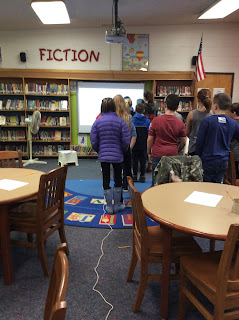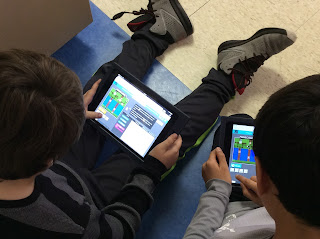I had the extreme pleasure of hearing Oliver Jeffers speak about his new book Here we are (which I purchased for Upham library for the birthday book program). His new book was written as a "guide" to his newborn (at the time) son (he even incorporated his son into his presentation!). The illustrations are so beautiful and detailed-- I can't wait to share it with Upham students.
If you remember, I did an Oliver Jeffers author study lesson with second grade a couple of weeks ago and we read the book Stuck. Jeffers explained the inspiration behind the book-- he said he rented a house in Rhode Island a few years ago and found a huge, beautiful kite in one of the closets. He took it out to fly, but got it stuck in a tree. Worried about getting his security deposit back, he proceeded to throw items into the tree (like each of his two shoes!) to knock it down. If you have read the book, you know all of the thrown items also got stuck....!
Thursday, December 14, 2017
Sunday, December 10, 2017
Digital Citizenship
We have been doing a series of digital citizenship lessons in fifth grade. Some of the topics we have learned about:
- information- what's okay to share publicly and what should be kept private?
- power of words in a digital environment
- whose is that anyway? (copyright and avoiding plagiarism)
In the "power of words" lesson, we discussed reactions to different online statements and how to handle them. In this photo, students decided what had "crossed the line" and what hadn't, by stepping to one side of the line (the rope going down the middle of the library!). This photo shows the students in agreement-- the statement I had read hadn't crossed the line. However, for many of the statements, I had a handful of students on either side of the line. We talked about how important it is to think before typing-- should I post that? How might the other person feel?
Ask your student- what type of information should be kept private? What is okay to share publicly? Can you download an image from the internet and put it in your report? How can you respect others' work you find online?
More of these digital citizenship lessons to come-- but first we shift gears for the next few weeks to focus on a science project for the classroom.
Monday, December 4, 2017
Hour of Code
Did you know this week is Hour of Code? Students from around the world try to spend an hour writing code and Upham is no exception! Learn more at hourofcode.org.
Most grades are participating in hour of code in their classroom- but second grade is doing it during their library class. 2M students worked hard today:
Most grades are participating in hour of code in their classroom- but second grade is doing it during their library class. 2M students worked hard today:
Students were encouraged to help each other before getting help from a teacher.
Success!
Students in 4O did hour of code in their classroom today and I got to help out:
You can do hour of code from home! Check this website for different activities.
Students in 4O did hour of code in their classroom today and I got to help out:
You can do hour of code from home! Check this website for different activities.
Sunday, December 3, 2017
Cite this!
Fourth graders have been working hard for four weeks on citations. We have discussed why we need to cite others' ideas and how to do it (third graders learn to cite, but in a more basic way). In the third week, they practiced writing their own book citations. Later in the year, they will use the electronic tool NoodleTools, which makes the process much easier:
Subscribe to:
Comments (Atom)












